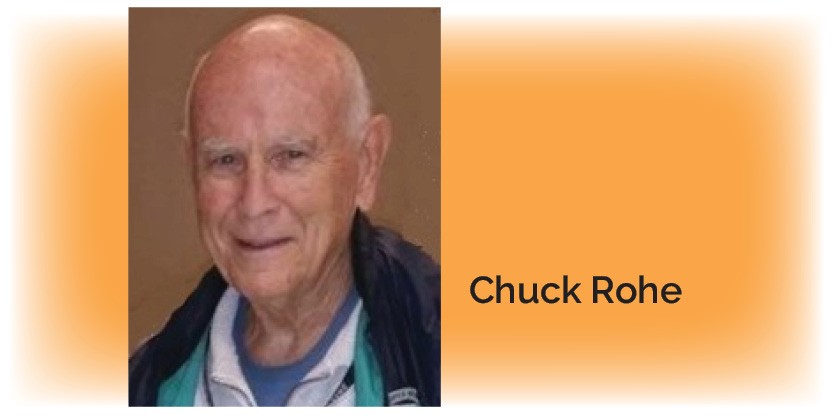For some strange reason, I thought former Tennessee track coach Chuck Rohe would live almost forever.
He always had five more things to do and the skill, energy and determination to do them. He slept very quickly. Enthusiasm overflowed. Every day was “What a day!”
Chuck lasted to 92. He died at 7 a.m. Tuesday at Cornerstone Hospice in Ocoee, Fla. That was more convenient than in long-ago times when he would wake me at 4 to report that he had just signed a runner or jumper or someone who threw things.
Several former Vols visited the coach in recent days. Vol for Life Dave Storey decorated his room with pictures of UT glory days and relatively recent birthday celebrations to let him know good times are never forgotten.
Of the hundreds of people I have known in my decades of involvement with University of Tennessee athletics, Chuck was in the very small group who accomplished more with fewer resources. He had a magical touch as a recruiter. He could “see and sell” Tom Black Track before it was built, when there was nothing there. He actually glamorized the old tobacco barn as an indoor training and development center. There were no lights.
Tennessee’s track recruiting budget was almost always tight. When the squeeze was on, he used postcards instead of far more expensive phone calls. For giant dreams and wild innovation, Chuck Rohe was first in his class.
As I once wrote, some legends are plastic. Some are pumped-up products of public relations machines. Some are hand-me-down fairy tales. The legendary Chuck Rohe was real. He took Tennessee track from nowhere to pretty close to the top of the world. After that, he did other exciting things.
There was no need to stretch his tall tales. It is the honest-to-goodness truth that the Volunteers once got off their stalled bus in the middle of a night and pushed it to the nearest gas station.
Rohe is remembered nationally as the coach who performed an eight-year Tennessee miracle, planning and building from flat nothing to 19 consecutive championships in Southeastern Conference outdoor track, indoor track and cross-country.
Before that, Rohe was coach at Furman.
Chuck was coordinator of football recruiting for Doug Dickey and, from time to time or at the same time, U.S. Olympic committeeman, athletic administrator at Virginia Tech, promoter of various and sundry enterprises designed to make money, vice president of Pace Management in Houston, part-owner of a partly professional football team, executive director for 20 years of what became the Florida Citrus Bowl and, later in life, owner, organizer and driving force behind coaching clinics named for Nike.
It was not uncommon to have 10,000 coaches as students.
There is a Pace Management story involving Knoxville Track Club friends Charley Durham and Al Rovere. Chuck had a major meet coming up in New Orleans. He asked them to fly down and help organize officials.
“We went,” said Durham. “He gave us a printout of all that needed to be done and said goodbye.”
Do what? The friends could not believe their ears. They were suddenly co-directors of the track meet. Rohe said he had another project in Dallas.
“See you Sunday.”
If you are a scorekeeper, Rohe convinced Dickey that track athletes and football players were sometimes one and the same. His best examples were Richmond Flowers and Chip Kell.
Rohe was the motivator in the racial integration of UT sports. While the Vols were preparing the public for 1968 acceptance of football receiver Lester McClain, Rohe had track runners Audry Hardy and James Craig signed and sealed, just awaiting announcement.
Old Vol Bob Barker has a “Coach” story he feels compelled to share.
“At the 1965 SEC cross-country championship meet in Birmingham, we had just swept the first six places. All the runners were around the finish chute. Some were gagging, some trying to avoid death.
“Along comes Coach Rohe, right through the middle of all the teams, and in his booming voice he yells: ‘Okay, guys, let’s get in five miles now, so we don’t have as much work to do when we get home this afternoon.’
“And off we trotted onto the golf course for a team training run.”
Old Vol Coppley Vickers told about the only time he cut a workout short.
“I got started late and was going to be late for something else. I had heard about those who would walk across the railroad trestle over the river. I got about half way across when a train started across from the opposite end.
“I climbed under the trestle, hung on until the train went over me, then got back up and made it across. First and last time.
“I did not know anyone knew until we were riding down the river at the last reunion. Coach was sitting near me. He looked up and said ‘Vick, isn’t that your trestle where you got caught in the middle by a train?’”
Vickers said Coach Rohe made a major impact on his life.
“He planted the seed that I should go to law school. And he planted in my mind his life philosophy, ‘What a Day!’
“I loved him and had no way to repay the major debt of gratitude.”
Marvin West welcomes comments or questions from readers. His address is marvinwest75@gmail.com.

